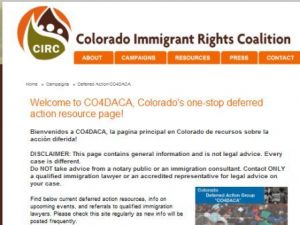Denver African Immigration Attorney Explains DACA

But what exactly is this new law and how can families take advantage of it. Here are some explanations:
The government through the Department of Homeland Security (DHS) -Immigration and Customs Enforcement (ICE), is presently making determinations called “prosecutorial discretion” on how to pursue enforcement of U.S. immigration laws against a particular individual.
This discretion can take many forms, such as whether to arrest or detain an individual, whether to send an individual to an immigration judge or even whether to remove an individual if their case is unsuccessful. The purpose of prosecutorial discretion is to identify cases that are low enforcement priorities for DHS and instead use its resources to pursue immigration enforcement against individuals with a severe criminal history or who have committed fraud against the US government.
The present deferred action of childhood arrivals process, aimed at making certain eligible youth a low enforcement priority, was announced by Secretary of DHS, Janet Napolitano on June 15, 2012, as a form of prosecutorial discretion. The actual procedures for filing for deferred action were announced by the United States Citizenship and Immigration Service on August 15, 2012. Through deferred action, a qualified and approved applicant will be able to work in the United States for a period of 2 years and will be considered a low priority for immigration authorities, including removal from the United States. It does not cost any money to apply for deferred action, but to apply for employment authorization it is $465.00.
Deferred action does NOT give an individual legal immigration status or offer a way to eventually become legal in the United States. This process is also discretionary and is decided on a case by case basis. While this process is not comprehensive immigration reform, it is a great step in the right direction.
It is also important to note that the deferred action for childhood arrivals program has been initiated under the present presidential administration. The winner of the presidential election this November will determine whether this program remains available for eligible applicants.
What are the requirements in order to be considered for Deferred Action?
- Were under the age of 31 as of June 15, 2012;
- Came to the United States before reaching your 16th birthday;
- Have continuously resided in the United States since June 15, 2007, up to the present time;
- Were physically present in the United States on June 15, 2012, and at the time of making your request for consideration of deferred action with USCIS;
- Entered without inspection before June 15, 2012, or your lawful immigration status expired as of June 15, 2012;
- Are currently in school, have graduated or obtained a certificate of completion from high school, have obtained a general education development (GED) certificate, or are an honorably discharged veteran of the Coast Guard or Armed Forces of the United States; and
- Have not been convicted of a felony, significant misdemeanor, three or more other misdemeanors, and do not otherwise pose a threat to national security or public safety.
Things to consider before applying for deferred action
Before you apply for deferred action, it is a good idea to be sure that you actually qualify for this program. There is an online tool that can be used to check your eligibility for deferred action and can be accessed here, http://www.weownthedream.org/deferred-action.
If possible, it is best to seek out an experienced immigration attorney and schedule a consultation to be sure that you are in fact eligible to apply. If you have any criminal history or have any questions about your eligibility, you should seek out an experienced immigration attorney.
If you apply and you do not qualify, depending upon your circumstances, DHS can initiate removal proceedings against you. In Colorado, there are a few nonprofit organizations that may be able to assist you with immigration lawyer referral lists and pro bono services, including the Rocky Mountain Immigrant Advocacy Network and the Colorado Immigrant Rights Coalition.

